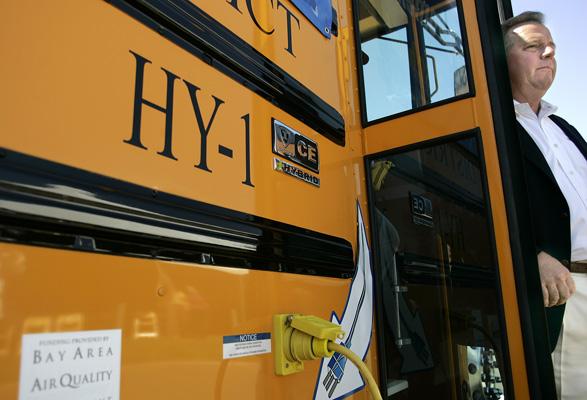Educating with the Environment in Mind
When school staff and officials at the Napa Unified School District got together with the Board of Education, they envisioned a campus that offered a dynamic learning environment. With the opening of American Canyon High School (ACHS) in fall 2010, they achieved just that and much more.
Not only is ACHS an innovative campus, but it has been emphasizing sustainability since its inception. It is the very first school to complete the Collaborative High Performance Schools (CHPS) Verified Program from start to finish. This accomplishment defines the school as one that has demonstrated the benefits of decreased operating costs and increased energy savings.
As part of those high performance features, ACHS was designed by Quattrocchi Kwok Architects to embrace its values of environmental stewardship and education by saving energy, using responsible materials, saving water and creating a healthy learning environment. The green campus eliminates the need for more than 160,000 miles of bus tries annually to Vintage High School in Napa, which reduced its greenhouse gas emissions and the climate impact on the planet.
What Actions Did American Canyon Take to Save Energy?
By providing natural daylight in every classroom, the school not only saves energy but promotes a better learning environment. The high school was calculated to exceed Title 24 2008 Energy Code by 18 percent. It uses substantially less energy by using a ground source heat-pump mechanical system, an energy management system, thermally efficient building materials, efficient fluorescent lighting, and on demand water heating. The school will have a 1 megawatt PV system that will provide up to 80 percent of the school's electricity. The upfront cost of the PV system was offset by a financing program created by the National Development Council and the Gasser Foundation.
What Actions Did American Canyon Take to Conserve Water?
American Canyon High School will use less than half of the potable water of a typical high school. Water-saving features include low-flow fixtures, dual-flush toilets and waterless urinals. Most of the fields and landscaping on-site will be irrigated with reclaimed water. One of the athletic fields is made from turf, which reduces the need for water by approximately 1 million gallons annually.
How Green Is American Canyon’s Construction?
A number of ACHS’ features make its construction green. Not only does the campus have a drought-tolerant native landscaping design, but its ground source is a geothermal mechanical system. it is a campus with an energy-efficient lighting design that uses recycled, rapidly renewable materials that do not give off volatile organic compounds. Officials recycled 75 percent of all construction debris during ACHS’ design.
American Canyon High School has set an amazing example for other schools in the Napa Valley Unified School District and beyond to implement and promote climate-friendly actions in order to reduce their environmental impact. Students and staff have created a new tradition at ACHS that will continue for generations to come.
“[By] incorporating green efforts into the learning environment of a high school rich with technological amenities, from which students will participate and witness our changing world, is a very positive educational experience.” - Don Evans, Director of General Services, Napa Valley Unified School District

An environmentally responsible high school designed to meet sustainability goals and promote green practices
Climate Actions
- Provides exceptional daylighting, outdoor views, good indoor air quality, and thermal comfort
- Uses natural drainage for landscaping
- Incorporates recycled, sustainably-produced, and low or no VOC materials
- Reduces energy with green technologies and solar photovoltaics (PV) panels
- Saves water with cistern and water-conserving fixtures
- Maintains recycling and green cleaning programs
- Bicycle parking for 10 percent of students
- Uses hybrid electric/biodiesel fueled buses
Upfront Cost Associated with Green Practices
- $5 million for the PV system (7.5 year payback)
- No cost premium for entire school
Total Estimated Greenhouse Gas Reductions
- 16 metric tons CO2e
Estimated Yearly Cost Savings
- $300,000 in electricity savings from the PV system
- $40,000 for other energy efficiency features
- Total annual cost savings: $340,000
